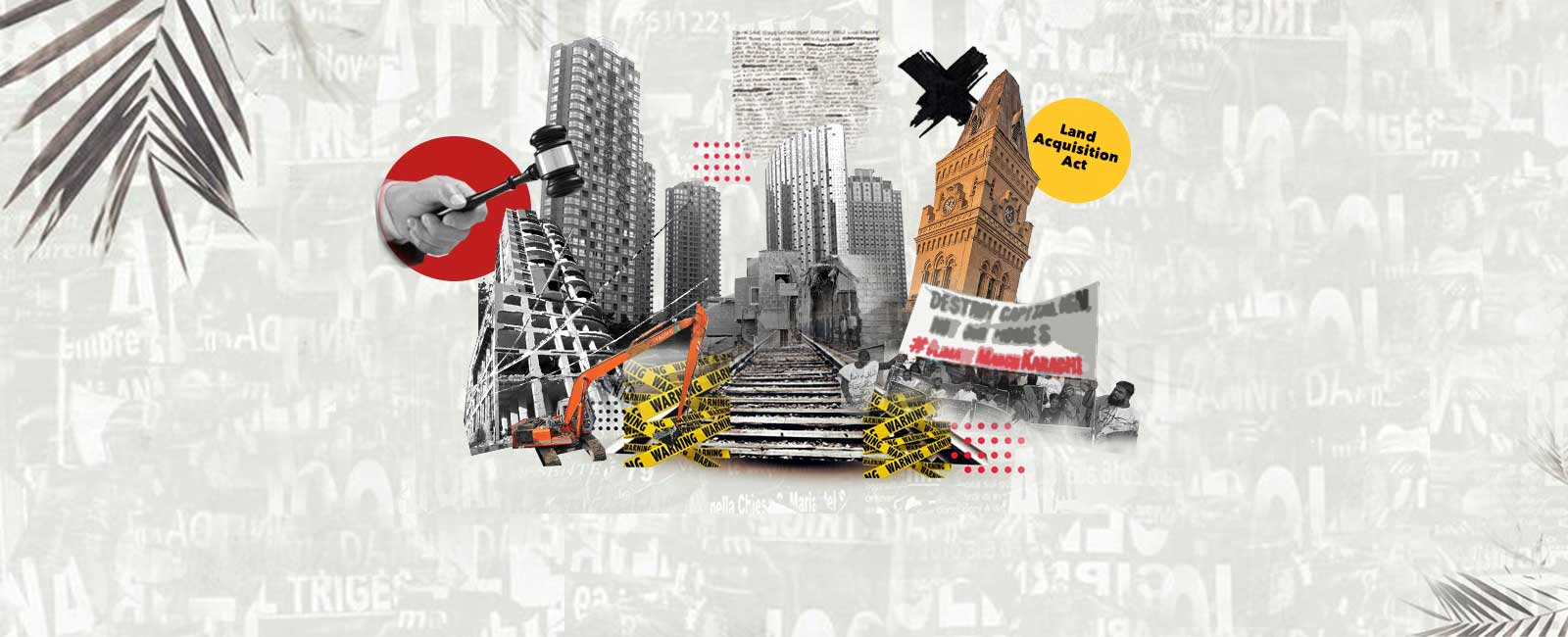(In)justice to displaced families continues as legal loopholes galore in Pakistan
There is urgent need for amendment in Land Acquisition Act 1894 to include provisions for resettlement and rehabilitation

In Karachi, a bustling metropolis in South Asia, it's an all-too-familiar sight: families huddled outside, surrounded by all their worldly possessions.
This poignant scene serves as a haunting reminder of the deep-rooted inequalities in the city's housing landscape, as well as the failure of many new housing initiatives to address the issue.
Even more concerning is the ongoing violation of the residents' basic right to dignity, which is enshrined in Article 14 of Pakistan's Constitution. The situation begs the question: when will authorities take meaningful action to address this crisis and ensure every person has access to safe and secure housing?
The uncertain fate of neighbourhoods facing displacement and demolition in Pakistan has sparked intense debate, with critics questioning the justification of such actions under the guise of 'development' or 'rule of law". In the case of the 'Nasla Tower', state institutions issued a no-objection certificate, only for residents to face the harsh reality of displacement and the loss of their homes due to former chief justice of Pakistan Justice (retd) Gulzar Ahmed's suo motu action.
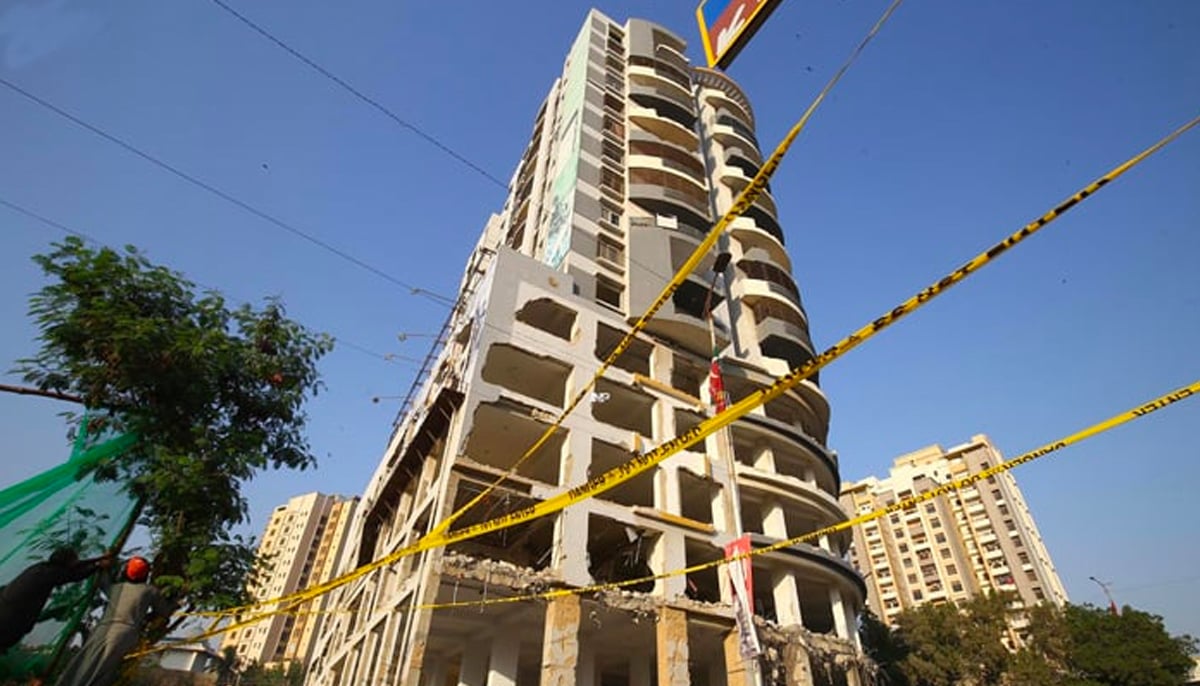
With such precedents in mind, residents in similar neighbourhoods in Karachi fear they, too, may face the same fate, despite the legal formalities and fees paid to secure their current homes. As the debate rages on, the future of these neighbourhoods remains uncertain, leaving many residents in a state of limbo and anxiety.
The plight of thousands of families forced to live under the open sky in Karachi's informal settlements is a poignant reflection of the city's struggle with affordable and adequate shelter. Settlements located along the Karachi Circular Railway (KCR) track, Gujjar and Orangi Nullah, and most recently, Mujahid Colony, are just a few examples of the areas where residents have been denied their right to a decent living space.
Double displacement
Double displacement is a growing concern in millennial Karachi, with reports of multiple cases. In 2007, over 1,500 households were resettled due to the reconstruction of Preedy Street, and now, over a decade later, they face a second displacement.
The KMC leased them 49 acres of land, but in 2017, the Karachi Water and Sewerage Board claimed the land belonged to them and ordered residents to evacuate. The situation has left residents uncertain about the rightful ownership of the land and at the mercy of local authorities.
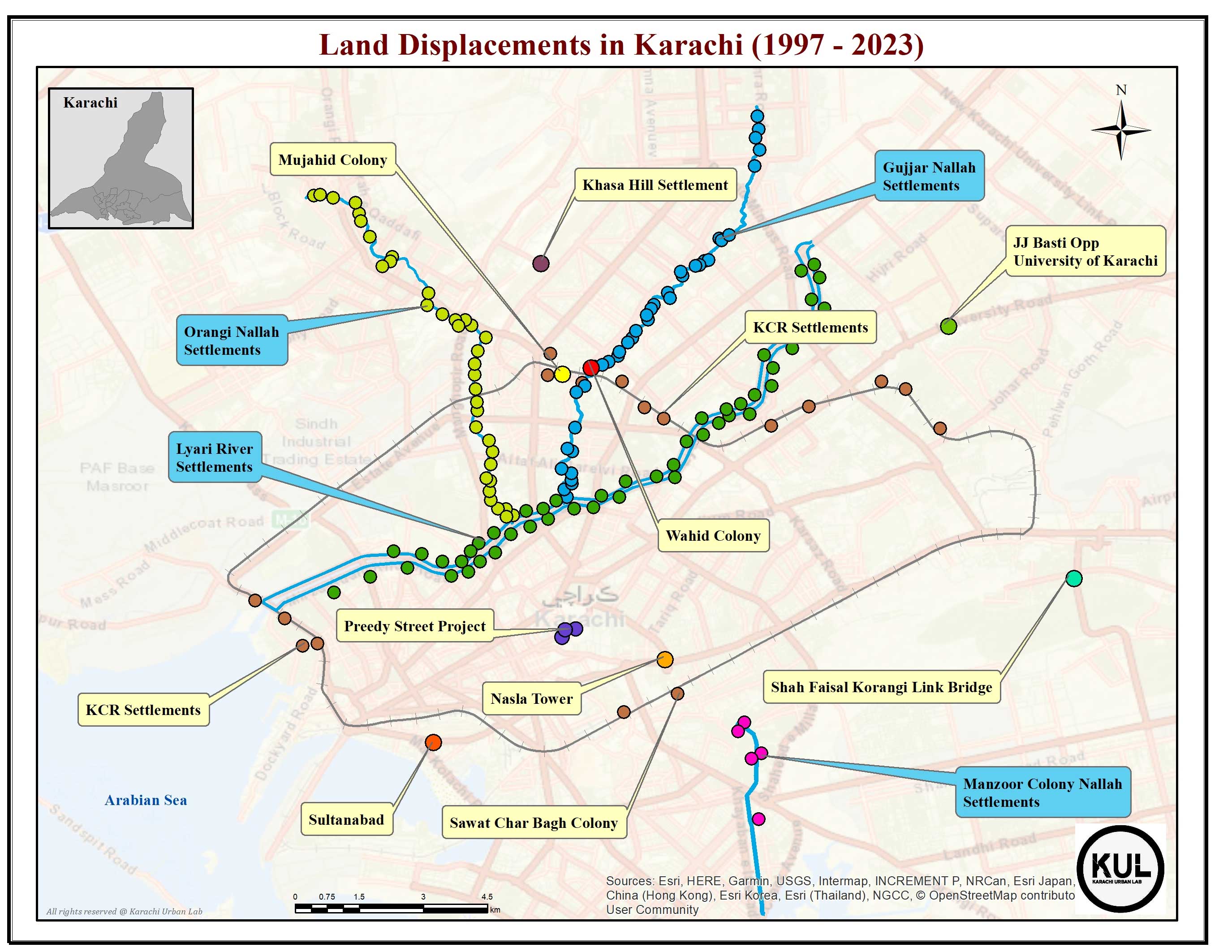
Located in the New Karachi area, Godhra Camp, also known as Fatima Jinnah Colony, a settlement despite having Karachi Development Authority (KDA) leases, the residents faced displacement once again. This location was originally established as a resettlement site in 1965, with residents relocating from Jail Road.
However, over the years, the Gujjar Nullah has shifted its position, and in 2020, it was close to Fatima Jinnah Colony. As the rehabilitation of Gujjar Nullah began, the Karachi Metropolitan Corporation (KMC) displaced them.
Threat not just confined to Karachi
Around 1,400 Christian families in Islamabad are facing the prospect of being evicted from their homes to make way for the development of a new highway. The families had originally settled in Sector H-9 of Islamabad back in 2012, seeking refuge after the Rimsha Masih blasphemy case. Now, the CDA is seeking to construct the 10th Avenue, requiring the land occupied by these families.
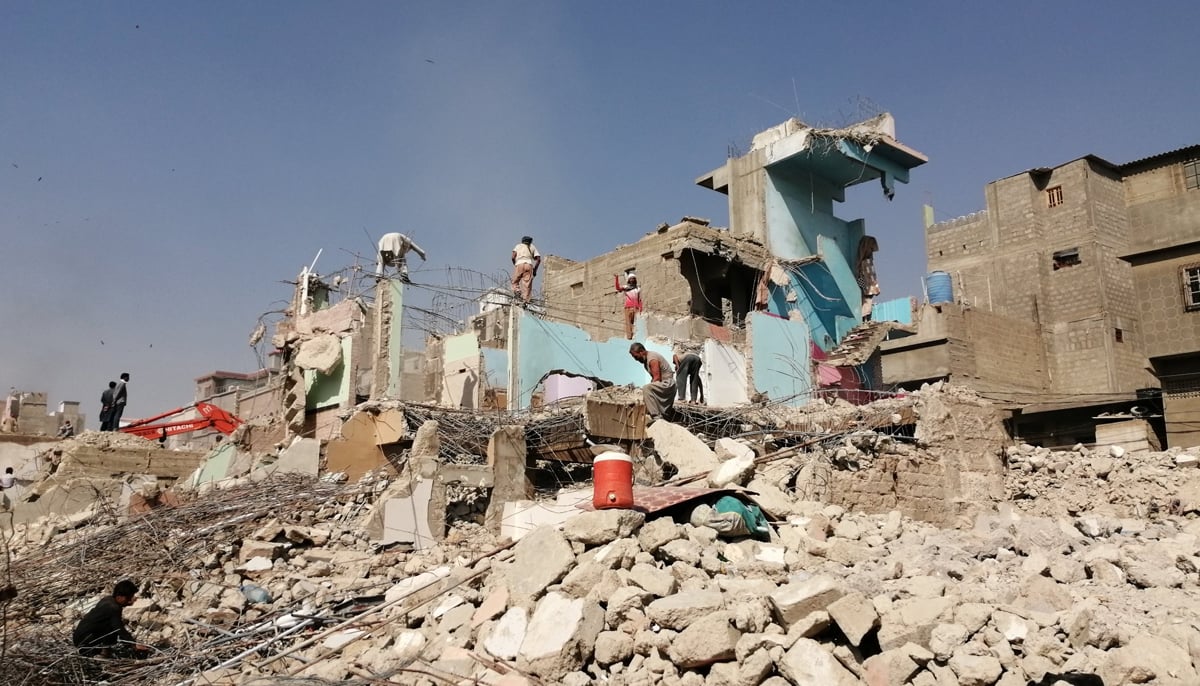
Unfortunately, these families have no tenure security, and as a result, they are now facing displacement once again. Complicating matters, there is currently no law in Pakistan to aid non-title holders in resettlement, leaving the affected families with few options for recourse. The families now face an uncertain future as they fight to keep their homes in the face of this impending development.
Unjust impact of Land Acquisition Act of 1894
Pakistan's Land Acquisition Act, 1894 (LAA, 1984) continues to be the de facto law for acquiring land for development. The colonial-era law grants the state the power of eminent domain to acquire land for "any public purpose" with "just" compensation. However, the law does not include provisions for resettlement and rehabilitation, and it disproportionately affects non-titleholders who are not recognised as beneficiaries of compensation for forced displacement.
This loophole in the law perpetuates social and economic disparities and raises questions about the state's commitment to protecting its citizens' fundamental rights. The Act, which was originally used to acquire land for "public purpose," provides no avenue for contesting the government's justification for acquisition or the definition of affected parties.
Officials often resort to threatening and intimidating tactics during the process, and the possibility of receiving no compensation is a real worry for those impacted.
Amendments to Land Acquisition Act of 1894 – in regional context
The Land Acquisition Act of 1894 was enacted in Pakistan, India, and Sri Lanka, but it has undergone amendments over time and now applies to India and Sri Lanka. India has implemented a National Rehabilitation and Resettlement Policy in 2007 and Right to Fair Compensation and Transparency in Land Acquisition, Rehabilitation, and Resettlement Act in 2013. Sri Lanka has approved the National Involuntary Resettlement Policy in 2001 to reduce the negative impacts of involuntary resettlement.
These policies aim to compensate all affected persons and improve their post-acquisition social and economic status. Now, the government is required to conduct a survey of affected families, prepare a draft rehabilitation and resettlement scheme within a time limit, and conduct a public hearing before making the scheme public.
Calls for amendment of Land Acquisition Act 1894 in Pakistan
The Supreme Court of Pakistan has frequently intervened in land issues in Karachi, but such interventions have often complicated the situation. The lack of a law that supports non-title landholders has exacerbated the issue, and it is essential to limit evictions.
In 2018, a judgment of the Supreme Court of Pakistan about the need to supplement and improve the Land Acquisition Act 1894 in a civil petition No. 1476 to 1485 stating, “The Land Acquisition Act , 1894 remains a remnant of colonial times that should have been timely amended to cater our evolving socio-economic circumstances.
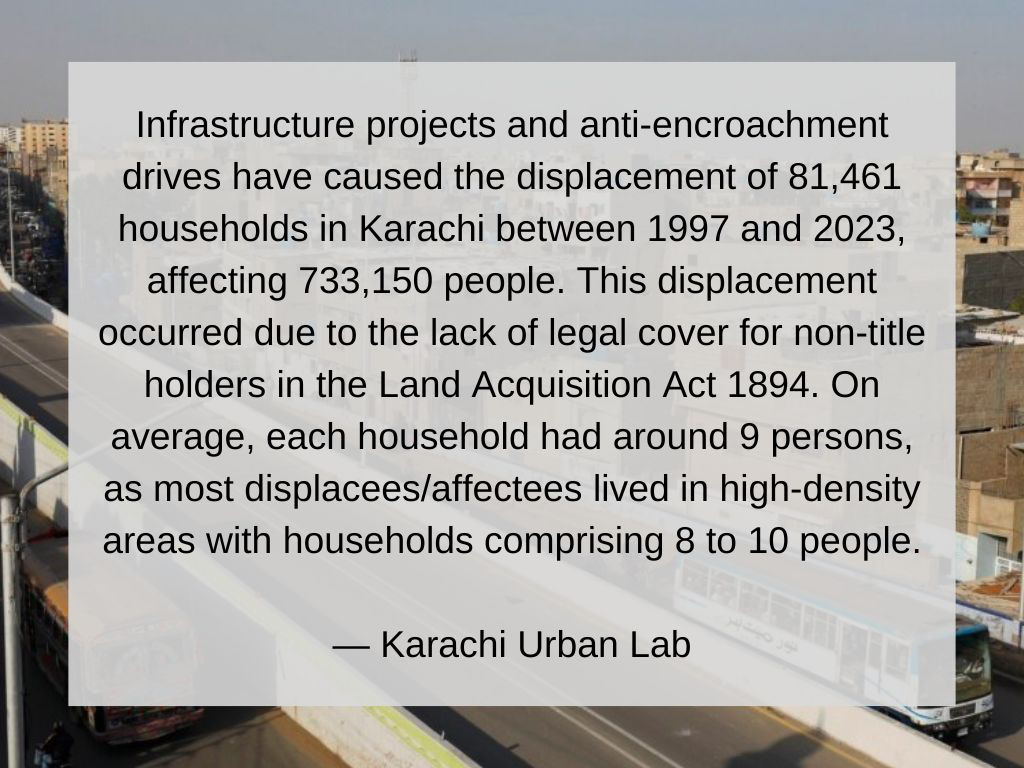
Therefore, such an overhaul became necessary considering the current scheme of land acquisition. The existing law distinguishes between "titleholders" and "non-titleholders," favouring the former and placing an unjust burden on the latter, who frequently rely on land access rather than ownership for their livelihoods.
In Karachi, 62% of the population lives in informal settlements where the majority lacks legal title to the land, leaving them without legal entitlement to compensation in situations of land acquisition for infrastructural development and forced displacement.
Pakistan's National Resettlement Policy: addressing shortcomings of Land Acquisition Act, 1894
The Resettlement Ordinance - 2001 was introduced in Pakistan to address issues with the Land Acquisition Act, 1894, which lacks accountability and protection for those affected by land acquisition. The National Resettlement Policy was drafted in 2002 to provide fair compensation and resettlement plans for both titleholders and non-titleholders.
It recognises non-titleholders as "affected persons" and ensures that they receive full compensation before any work begins, protecting them from eviction and dislocation. The policy represents a significant improvement over the Land Acquisition Act and provides a more just framework for land acquisition in Pakistan.
Shortcomings of Sindh Rehabilitation and Resettlement Policy 2022
In presence of the National resettlement policy draft, The Sindh Rehabilitation and Resettlement Policy 2022, currently being developed by the government, is facing criticism for several shortcomings. Firstly, there is no detailed background paper to inform the policy, and there has been a lack of district-level discussions before its finalisation.
Moreover, the policy appears to only cover foreign-funded projects that already have a resettlement option, which raises questions about its application to public versus private sector projects. Additionally, the policy is not retroactive and does not provide clarity on how the government will comply with Supreme Court orders to provide resettlement in cases such as the Karachi Circular Railway and Gujjar-Orangi Nullah.
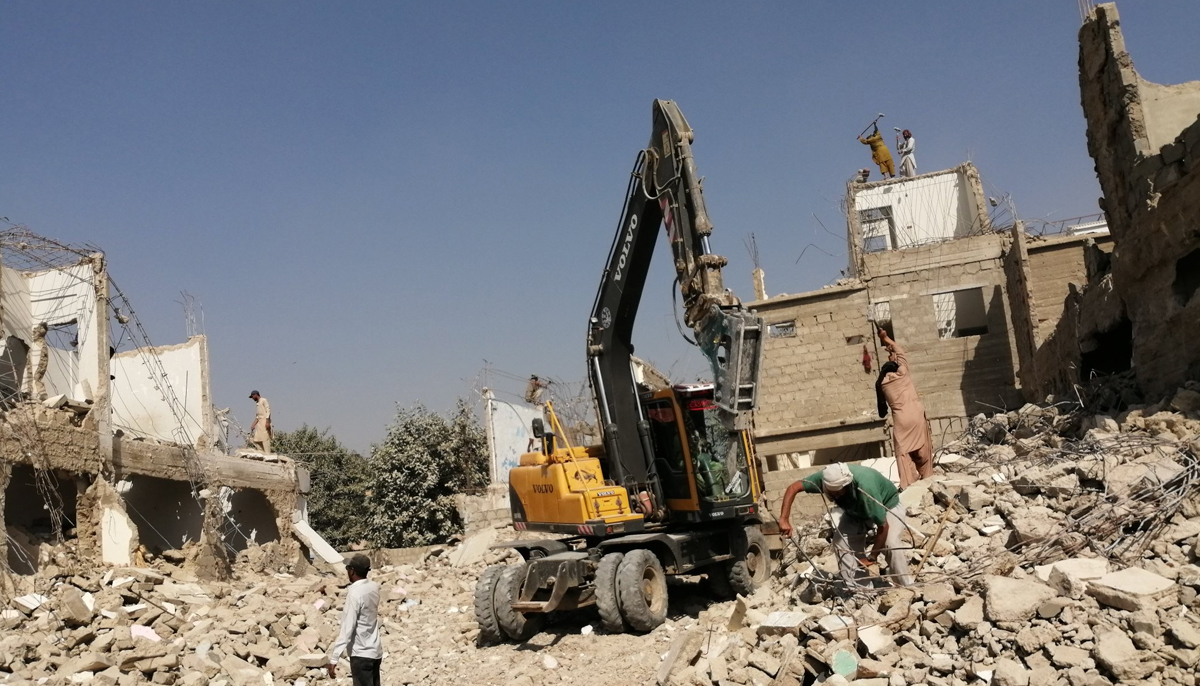
It remains unclear who will define the "projects" covered by the policy and which institution will set the criteria. Finally, the policy does not address the environmental impacts of resettlement at the new site and fails to adequately protect the rights of affected persons and address the social and environmental concerns associated with resettlement.
The policy is not inclusive and appears to be discriminatory towards affected communities. Under the policy, the decision to provide resettlement or cash compensation will be made on a case-by-case basis, but cash compensation will only lead to a return to the outdated LAA 1984.
This is concerning because the policy document states that the LAA 1894 will continue to apply to all situations, giving government officials discretionary power to decide whether to apply the Resettlement policy or compensate affected persons under the LAA 1984, which could result in discrimination.
The policy is not considering the different types of agricultural land that may be affected. The policy will lead to the potential for families to experience downward social mobility, loss of community ties, and loss of housing and livelihoods. So, there is an urgent need for an amendment in the Land Acquisition Act 1894 to include provisions for resettlement and rehabilitation.
Muhammad Toheed is an urban planner, geographer and Associate Director at Karachi Urban Lab, IBA. He tweets @UrbanPlannerNED



